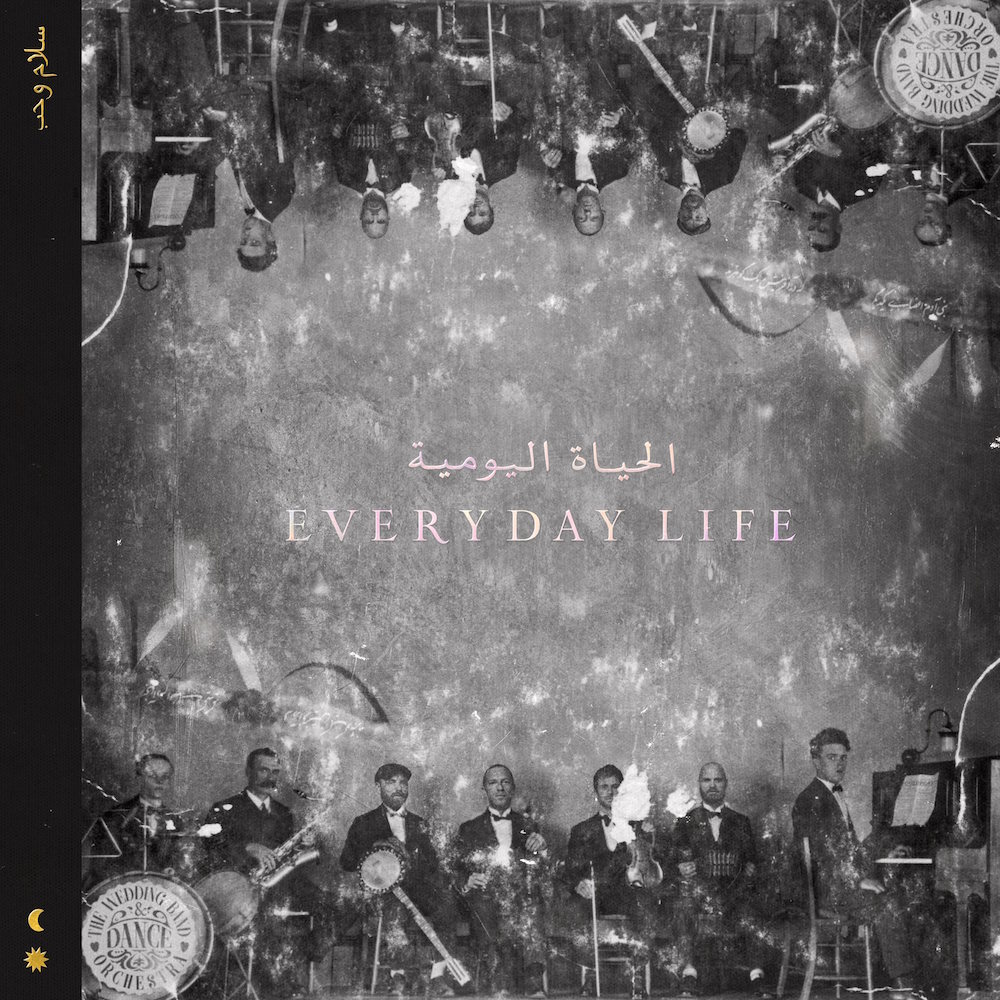Before they became one of the biggest bands in the world, Coldplay built their brand on heartfelt, direct messaging: “The truth is, I miss you,” “I will try to fix you,” “I never meant to cause you trouble.” But if they’re used to simple, they’re not anymore.
Following 2005’s X&Y, they’ve increasingly embraced maximalist pop—to the point where even a back-to-basics record like Ghost Stories climaxed with an Avicii collaboration. On 2008’s Viva La Vida, the occasional clunky lyric could hide behind the ambitious arrangements. But by the 2010s, Coldplay’s output increasingly focused on pop production at the expense of every non-Chris Martin member, leaving the more baffling couplets on songs like “Everglow” from 2015’s A Head Full of Dreams—“Like a lion you ran, a goddess you rolled/Like an eagle you circled, in perfect purple”—with nowhere to hide.
Thankfully, Coldplay’s eighth studio effort, Everyday Life, mostly brings the stakes back down to Earth, and the smaller scale allows them to tinker more freely with their sound. The result is their best album since 2011’s Mylo Xyloto, and their most provocative work to date. The first two singles don’t exactly indicate any lowered ambition. “Orphans” unites Martins Chris and Max for something as catchy as anything in either man’s back catalogue. Meanwhile, “Arabesque” is a gloriously bizarre six-minute odyssey, boasting a guest verse from lauded Belgian musician Stromae and a horn section featuring members of Fela Kuti’s extended family.
Those two stick out from the rest of the record, but that’s not a bad thing. Coldplay’s genre-hopping is generally underappreciated (Coldplay goes electro-pop! Coldplay does My Bloody Valentine!), and on this album, it truly shines. On “BrokEN” and “When I Need a Friend,” they explore gospel music; the latter in particular successfully retains the warmth of the best Coldplay songs, even if its sonics are uncharacteristic. “Guns” starts out worryingly Mumford-y, but Martin’s vocalizations lean instead toward classic country in a way that’s endearing instead of grating.
Even the songs that are more in their wheelhouse, like the X&Y throwback “Church” or stately closer “Everyday Life,” are more laid back, less intent on big emotions and big flourishes. When they do go big, they’re smarter about it, as in “Trouble in Town,” whose genuinely daring finish has the band soundtracking a clip of a Philadelphia police officer harassing a person of color.
In the last three years, just about every album from any artist has come with the disclaimer that it’s their most political, and Everyday Life’s inclusion of any message at all beyond “believe in love” or “open up your eyes” makes that true by default for Coldplay here. Even the relentless optimism of the poppier cuts feels defiant instead of ignorant.
This is still a Coldplay album, though, which means there are a smattering of slow songs whose effectiveness varies song by song, or even line by line. “Daddy” is a prime example, a finely constructed ballad from the point of view of a child—right until Martin warbles “daddy, it’s my birthday,” a line like a glitch in the system. This might be Coldplay’s most intimate album, but they can’t help going headfirst into sentimentality. “Champion of the World” interpolates “Los Angeles Be Kind” by Owl John, the solo project of the late Frightened Rabbit frontman Scott Hutchison. But in lieu of Hutchinson’s hard-won optimism, Martin winds up singing about the same things he always does: rocketships and conquistadors, taking flight into the universe—lyrics that could slot unnoticed into a Coldplay parody.
Everyday Life reveals that maximalism doesn’t define Coldplay’s current era so much as extremes of sensibility. A pop song won’t pass without giant stadium chants. A ballad will do everything in its power to wring tears out of listeners. A gospel song will involve a choir in a cathedral. A country-leaning song will have some yodeling. As a result, this record is scattered enough to alienate fans who want more consistently upbeat music. But if you’re onboard for the weirdness, the sequencing works surprisingly well.
From a record company’s perspective, the ideal next step for Coldplay is rushing out a straightforward pop album, which is reportedly their plan. Considering the risks they take here, that would be a disappointment. From Dean Lewis to recent Hot 100 topper Lewis Capaldi, the world has enough Coldplay offspring whose music sounds like what detractors think Coldplay sounds like, but never what the band actually does. If they do shift back, here’s hoping they’ll take the bold spirit of Everyday Life with them.





